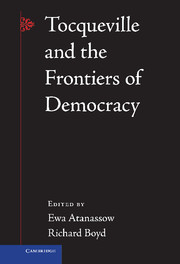Book contents
- Frontmatter
- Contents
- List of Contributors
- Short Title Abbreviations of Tocqueville's Major Works
- Acknowledgments
- Introduction: Tocqueville and the Frontiers of Democracy
- Part One The Meaning of Democracy and the Democratic Revolution
- Part Two Democratization in a Non-Western Context
- 4 Tocqueville and Religion: Beyond the Frontier of Christendom
- 5 Deliberating Democratization with Tocqueville: The Case of East Asia
- 6 Tocquevillean Thoughts on Higher Education in the Middle East
- Part Three Challenges of Globalization: Democracy, Markets, and Nationhood
- Part Four Democracy, Imperialism, and Foreign Policy
- Part Five Democracy's Old and New Frontiers
- Epilogue: New Frontiers, Old Dilemmas
- Bibliography of Works Cited
- Index
- References
5 - Deliberating Democratization with Tocqueville: The Case of East Asia
Published online by Cambridge University Press: 05 April 2013
- Frontmatter
- Contents
- List of Contributors
- Short Title Abbreviations of Tocqueville's Major Works
- Acknowledgments
- Introduction: Tocqueville and the Frontiers of Democracy
- Part One The Meaning of Democracy and the Democratic Revolution
- Part Two Democratization in a Non-Western Context
- 4 Tocqueville and Religion: Beyond the Frontier of Christendom
- 5 Deliberating Democratization with Tocqueville: The Case of East Asia
- 6 Tocquevillean Thoughts on Higher Education in the Middle East
- Part Three Challenges of Globalization: Democracy, Markets, and Nationhood
- Part Four Democracy, Imperialism, and Foreign Policy
- Part Five Democracy's Old and New Frontiers
- Epilogue: New Frontiers, Old Dilemmas
- Bibliography of Works Cited
- Index
- References
Summary
Introduction
In the millennial issue of the Journal of Democracy, public intellectuals from around the globe addressed issues affecting the future of democracy through the texts of Alexis de Tocqueville. The editors commented: “One may say with little exaggeration: We are all Tocquevilleans now.” This characterization is particularly true of scholars who study the emerging democratic politics of East Asia for two reasons. First, the theoretical point de départ of many of these scholars is eminently Tocquevillean. Just as Tocqueville combated the view of conservatives that France's aristocratic history and hierarchical religion rendered the French unfit for self-government, many theorists of democracy in East Asia struggle against the premise that patterns of paternalistic authority and popular dependency in Confucian societies prevent true democratization. However, just as Tocqueville also doubted that socioeconomic development would eventually bring freedom in its wake, directing attention instead to the uncertain political trajectory of transitional societies, many contemporary observers of Asian economic tigers argue that the fate of democracy in the region is unclear. Consolidating democracy, they argue, depends on contingent connections among modernization, political cultures, state structures, and political will. They are speaking Tocquevillean prose without knowing it. A second reason for Tocqueville's salience in this context arises from a different sort of conjoncture. Unlike other nineteenth-century theorists of the European democratic transition, who tend to reject both the form and dynamics of traditional cultures, Tocqueville's normative and rhetorical concerns align him in a particular way with a group of East Asian intellectuals who draw on the ghosts of the past to reorient the present. A consideration of Tocqueville's attempt to go beyond nostalgia and avoid self-delusion, I argue, may be instructive for East Asian theorists who share this hope.
- Type
- Chapter
- Information
- Tocqueville and the Frontiers of Democracy , pp. 111 - 132Publisher: Cambridge University PressPrint publication year: 2013

